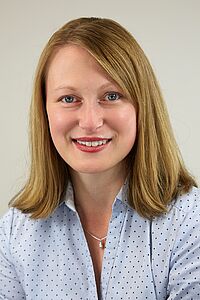
Doris Häge, M.Sc.
D-65366 Geisenheim
Room 01.06
Von-Lade-Straße 2
65366 Geisenheim
Doris Häge born on the 8th of April 1984 completed her diploma studies at the University of Applied Sciences in Fulda in 2008. She completed a master degree International Food Business and Consumer Studies with her Thesis "Free Choice Profiling of Typical Armenian Cheese Varieties". In parallel she was working as a scientific assistant (third party funded) at the University of Kassel, Department of Organic Food Quality and Food Culture.
After working as a Sensory Scientist II, by supporting international projects for various chocolate brands, with Mondelēz International Inc. in Reading UK, she worked as sensory scientist and product developer for cream cheese and curd at Karwendel Werke Huber GmbH & Co. KG.
Since September 2016 she is working as a scientific assistant at the University of Geisenheim, Institute of Enology. Besides teaching sensory science and supervising Bachelor and Master Thesis, she is responsible for Training and Management of the University's sensory Panel. Additionally, she working on first research projects on the topic of Food Pairing.
Project start: 01.09.2020
Project end: 31.08.2023
Sponsor: Development agency for agribusiness
“Witality – Wine in Virtual Reality” is a collaborative research project between the scientific community and industry experts. Participating institutions are Hochschule Geisenheim University, Department of Enology, University of Applied Science Bonn-Rhein-Sieg, Institute of Visual Computing, Pieroth Wein AG and DLG Test Service GmbH. The three year reserach project is funded by the Develpment Agency for Agribuiness. The partners are focusing on practice-oriented research on the use of virtual reality (VR) for sensory analysis of wine. The University of Applied Science Bonn-Rhein-Sieg will develop a special VR software to simulate typical locations for wine tastings, such as bars and wine shops. With smart glasses, consumers can immerse in these virtual realities. At the beginning of the project, Hochschule Geisenheim University will determine how olfactory and acoustic stimuli in VR affect the sensory evaluation of wine. To that end, the simulated situations are analyzed in comparison to an evaluation in a standardised evironment like sensory laboratories. In a next step, researchers will examine how the sensory evaluation of samples changes when they are consumed under different conditions (e.g. standard sensory laboratory, wine shop vs wine shop simulated in virtual reality). Pieroth Wein AG and DLG Testservice GmbH will test the usability of the smart glasses and software, too. The aim of the project is to provide a tool that can be used by various stakeholders in the wine industry for many different reserach questions and thus helps to open up new market segments and consumer groups.
Project start: 01.01.2020
Project end: 01.01.2023
Sponsor: Landesamt für Natur, Umwelt und Verbraucherschutz
The three-year research project “Korn B – sustainable extension of crop rotation using old spring cereals in water sensitive areas and the evaluation of their suitability for baking and brewing.” is funded by the European innovation partnership (EIP). Project partners are reflecting the whole value chain. Farmer, baker, brewer and the chamber of agriculture North-Rhine Westphalia as well as the city of Hamminkeln are conducting research on cereals extracted from genetic libraries. The university of Griesheim’s main focus will be on the evaluation of the cereals suitability for baking and brewing by applying malting and brewing experiments on a small- and pilot-scale, together with baking tests following standardised procedures.
Project start: 01.01.2018
Project end: 31.12.2019
Sponsor: uratorium für Technik und Bauwesen in der Landwirtschaft e.V.
Determining on a scientific basis why specific food and wine combinations are prefered by consumers and others not by using the food pairing and food completing theory.
Date: 28.11.2018
Location: Veitshöchheim (Deutschland)
Speaker: Häge, Doris
Date: 15.05.2018
Location: Frankfurt/Main (Deutschland)
Speaker: Häge, Doris
Date: 11.04.2018
Location: Weinsberg (Deutschland)
Speaker: Häge, Doris
Date: 12.02.2017
Location: Geisenheim (Deutschland)
Speaker: Häge, Doris


